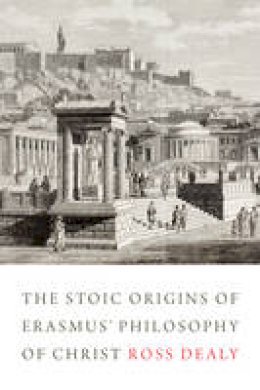
Stock image for illustration purposes only - book cover, edition or condition may vary.
The Stoic Origins of Erasmus´ Philosophy of Christ
Ross Dealy
€ 113.73
FREE Delivery in Ireland
Description for The Stoic Origins of Erasmus´ Philosophy of Christ
Hardback. This original and provocative engagement with Erasmus' work argues that the Dutch humanist discovered in classical Stoicism several principles which he developed into a paradigm-shifting application of Stoicism to Christianity. Series: Erasmus Studies. Num Pages: 424 pages. BIC Classification: DSBB; HPCA; HPCB; HRAB. Category: (P) Professional & Vocational; (U) Tertiary Education (US: College). Dimension: 239 x 161 x 38. Weight in Grams: 796.
This original and provocative engagement with Erasmus' work argues that the Dutch humanist discovered in classical Stoicism several principles which he developed into a paradigm-shifting application of Stoicism to Christianity. Ross Dealy offers novel readings of some lesser and well-known Erasmian texts and presents a detailed discussion of the reception of Stoicism in the Renaissance. In a considered interpretation of Erasmus' De taedio Iesu, Dealy clearly shows the two-dimensional Stoic elements in Erasmus' thought from an early time onward. Erasmus' genuinely philosophical disposition is evidenced in an analysis of his edition of Cicero's De officiis. Building on stoicism Erasmus shows that Christ's suffering in Gethsemane was not about the triumph of spirit over flesh but about the simultaneous workings of two opposite but equally essential types of value: on the one side spirit and on the other involuntary and intractable natural instincts.
Product Details
Publisher
University of Toronto Press
Format
Hardback
Publication date
2017
Series
Erasmus Studies
Condition
New
Weight
796g
Number of Pages
424
Place of Publication
Toronto, Canada
ISBN
9781487500610
SKU
V9781487500610
Shipping Time
Usually ships in 7 to 11 working days
Ref
99-1
About Ross Dealy
Ross Dealy is a retired associate professor from St. John's University.
Reviews for The Stoic Origins of Erasmus´ Philosophy of Christ
`This meticulous study of 16th century thinking can be dense, but the picture of Erasmus that emerges will prove worth the effort.'
D.A. Brown
Choice Magazine vol 55:01:2017
The Stoic Origins of Erasmus' Philosophy of Christ is a challenging and thought-provoking book. It is a book that goes to the heart of the philosophical subject matter that is everywhere apparent in Erasmus's writings, but hardly ever studied in serious ways.
Han van Ruler, Erasmus Universiteit Rotterdam
Renaissance Quarterly, vol 71 4, Winter 2018
The Stoic Origins of Erasmus' Philosophy of Christ makes an important contribution to Erasmus scholarship through a close reading of two of Erasmus' early works that are rarely considered alongside one another, the De taedio Iesu and the Enchiridion, in an attempt to trace their considerable Stoic elements. v
Kirk Essary, University of Western Australia
Erasmus Studies, vol 39
The Stoic Origins of Erasmus' Philosophy of Christ contains many interesting ideas, which Dealy presents in an engaging way and is a welcome addition to the literature.
George Lazaroiu
Sixteenth Century Journal vol. 49, no. 1 2018
D.A. Brown
Choice Magazine vol 55:01:2017
The Stoic Origins of Erasmus' Philosophy of Christ is a challenging and thought-provoking book. It is a book that goes to the heart of the philosophical subject matter that is everywhere apparent in Erasmus's writings, but hardly ever studied in serious ways.
Han van Ruler, Erasmus Universiteit Rotterdam
Renaissance Quarterly, vol 71 4, Winter 2018
The Stoic Origins of Erasmus' Philosophy of Christ makes an important contribution to Erasmus scholarship through a close reading of two of Erasmus' early works that are rarely considered alongside one another, the De taedio Iesu and the Enchiridion, in an attempt to trace their considerable Stoic elements. v
Kirk Essary, University of Western Australia
Erasmus Studies, vol 39
The Stoic Origins of Erasmus' Philosophy of Christ contains many interesting ideas, which Dealy presents in an engaging way and is a welcome addition to the literature.
George Lazaroiu
Sixteenth Century Journal vol. 49, no. 1 2018
